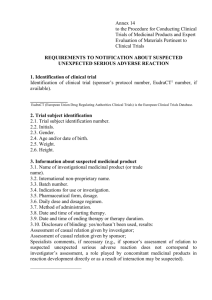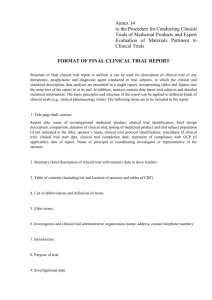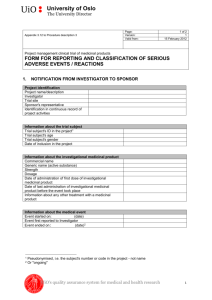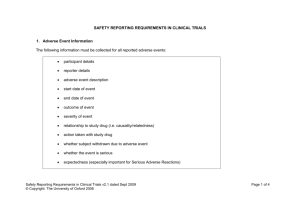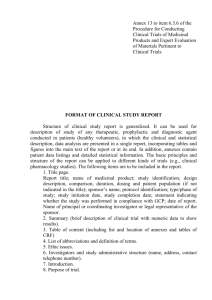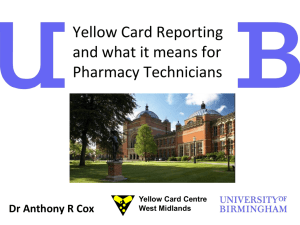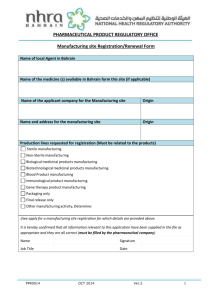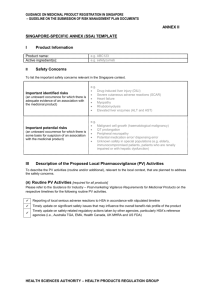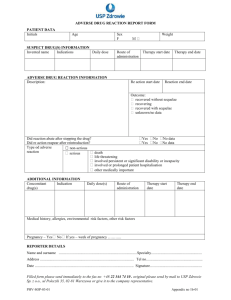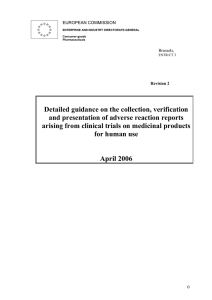AE - The King`s Health Partners Clinical Trials Office
advertisement
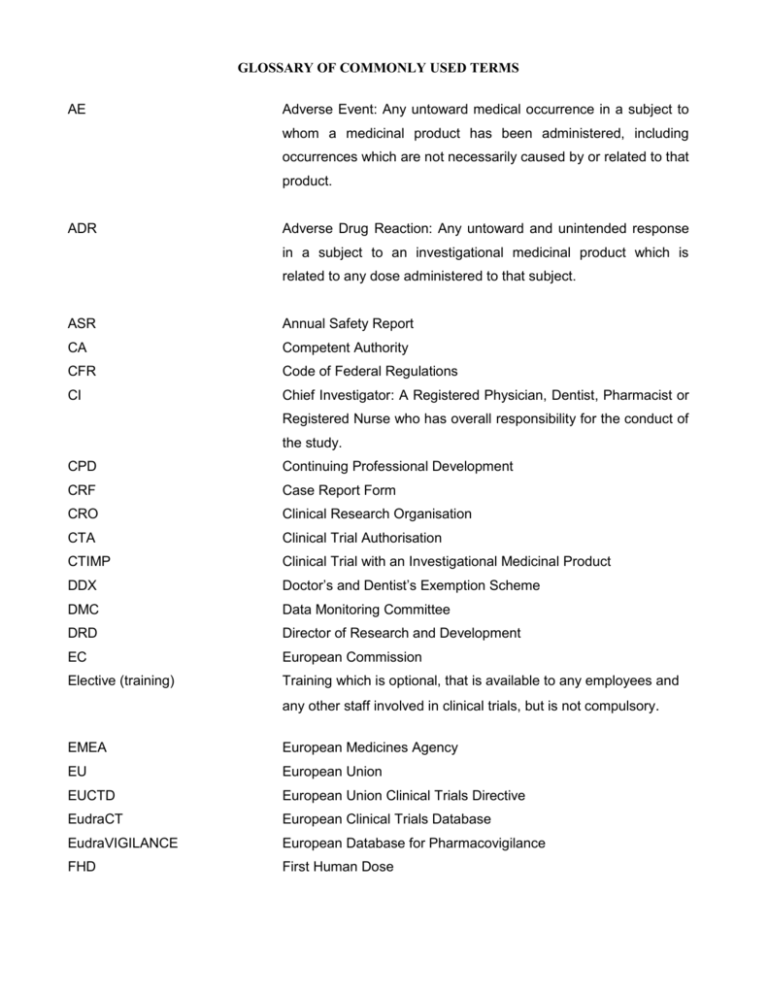
GLOSSARY OF COMMONLY USED TERMS AE Adverse Event: Any untoward medical occurrence in a subject to whom a medicinal product has been administered, including occurrences which are not necessarily caused by or related to that product. ADR Adverse Drug Reaction: Any untoward and unintended response in a subject to an investigational medicinal product which is related to any dose administered to that subject. ASR Annual Safety Report CA Competent Authority CFR Code of Federal Regulations CI Chief Investigator: A Registered Physician, Dentist, Pharmacist or Registered Nurse who has overall responsibility for the conduct of the study. CPD Continuing Professional Development CRF Case Report Form CRO Clinical Research Organisation CTA Clinical Trial Authorisation CTIMP Clinical Trial with an Investigational Medicinal Product DDX Doctor’s and Dentist’s Exemption Scheme DMC Data Monitoring Committee DRD Director of Research and Development EC European Commission Elective (training) Training which is optional, that is available to any employees and any other staff involved in clinical trials, but is not compulsory. EMEA European Medicines Agency EU European Union EUCTD European Union Clinical Trials Directive EudraCT European Clinical Trials Database EudraVIGILANCE European Database for Pharmacovigilance FHD First Human Dose GLOSSARY OF COMMONLY USED TERMS GCP Good Clinical Practice GMP Good Manufacturing Practice GP General Practitioner GSTFT Guy’s and St. Thomas’ NHS Foundation Trust IB Investigator’s Brochure IC Informed Consent ICH International Conference on Harmonisation ICTR Integrated Clinical Trial Report IMP Investigational Medicinal Product IMPD Investigational Medicinal Product Dossier ISRCTN International Standard Randomised Controlled Trial Number JCTO Joint Clinical Trials Office KCH Kings College Hospital NHS Foundation Trust KCL Kings College London MA Marketing Authorisation Mandatory (training) Training which must be completed by all employees and any other staff involved in clinical trials and is therefore compulsory. MHRA Medicines and Healthcare products Regulatory Agency: UK Competent Authority responsible for regulation of clinical trials. MRC Medical Research Council MS Member State NHS R&D National Health Service Research and Development Unit NRES National Research Ethics Service NHS National Health Service Participant An individual who consents to take part in a clinical trial PD Pharmacodynamic (studies) PI Principal Investigator: A Registered Physician, Dentist, Pharmacist or Registered Nurse who has responsibility for the research at a local site where the study involves specified procedures requiring site-specific assessment. GLOSSARY OF COMMONLY USED TERMS PK Pharmacokinetic (studies) POC Proof of Concept (studies) QA Quality Assurance QC Quality Control QP Qualified Person responsible for release of trial drug [Pharmacy] RCT Randomised Controlled Trial Main REC Main Research Ethics Committee: The REC that undertakes the review of the research protocol, including the content of the patient information sheet and consent form rather than just site specific approval for each centre. SAE Serious Adverse Event: A serious adverse event is defined as an adverse experience that results in any of the following outcomes:• death; • a life-threatening adverse experience (any adverse experience that places the patient or subject, in the view of the investigator, at immediate risk of death from the reaction as it occurred, i.e., it does not include a reaction that, had it occurred in a more severe form, might have caused death); • inpatient hospitalisation or prolongation of existing hospitalization; • a persistent or significant disability/incapacity (a substantial disruption of a person's ability to conduct normal life functions)'; • a congenital anomaly/birth defect. SAR Serious Adverse Reaction SDV Source Document Verification SI Statutory Instrument (1031 and amendment 1928) SmPC Summary of Product Characteristics SOP Standard Operating Procedure SSA Site Specific Assessment SUSAR Suspected Unexpected Serious Adverse Reaction: A Suspected Unexpected Serious Adverse Reaction is a serious adverse drug GLOSSARY OF COMMONLY USED TERMS reaction, the nature and severity of which is not consistent with the information about the medicinal product in question set out:• in the case of a product with a marketing authorisation, in the summary of product characteristics for that product. • in the case of any other investigational medicinal product, in the investigator's brochure relating to the trial in question. TSC Trial Steering Committee The Regulations Medicines for Human Use (Clinical Trial) Regulations 2004 transposed the EU Clinical Trials Directive into UK legislation, as Statutory Instrument 2004 no 1031. This became effective on the 1st May 2004. An amendment to implement Directive 2005/28/EC was made to the Regulations as Statutory Instrument 2006 no 1928. JCTO The Joint Clinical Trials Office: Established in 2006 by Kings College London, Guy’s & St Thomas’ NHS Foundation Trust and King’s College Hospital NHS Foundation Trust to provide a streamlined approach for all aspects of trial administration. Clinical Trial Any investigation in human subjects, other than a noninterventional trial intended to discover or verify the clinical, pharmacological or other pharmacodynamic effects of one or more medicinal product or to identify any adverse reactions to one or more such products and to study absorption, distribution metabolism and excretion in one of more such products with the object of ascertaining the safety or efficacy of those products. Partner Organisations King’s College London, Guy’s & St Thomas’ NHS Foundation Trust and King’s College Hospital NHS Foundation Trust. GLOSSARY OF COMMONLY USED TERMS Sponsor Organization(s) who takes responsibility for the initiation, management and financing (or arranging the financing) of a medicinal clinical trial (defined in the Regulations). UADR Unexpected Adverse Drug Reaction - An adverse drug reaction the nature and severity of which is not consistent with the information about the medicinal product in question set out :– • in the case of a product with a marketing authorization, in the summary of product characteristics for that product, • in the case of any other investigational medicinal product, in the investigator's brochure relating to the trial in question.
